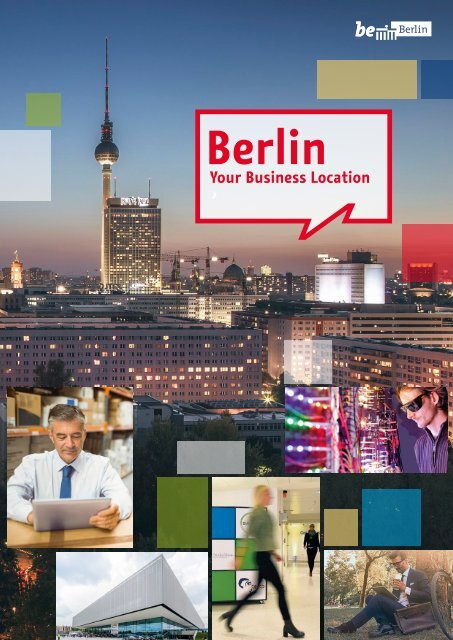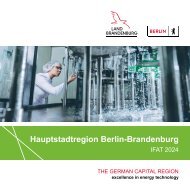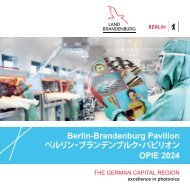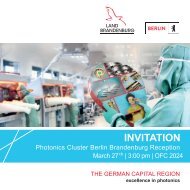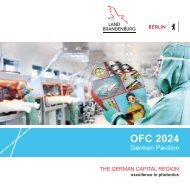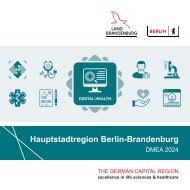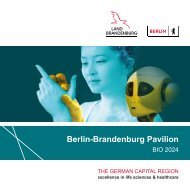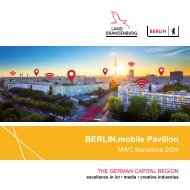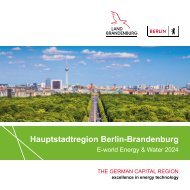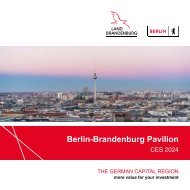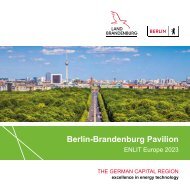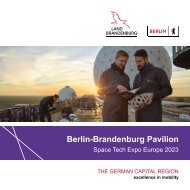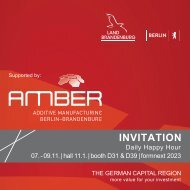Berlin: Your Business Location
You also want an ePaper? Increase the reach of your titles
YUMPU automatically turns print PDFs into web optimized ePapers that Google loves.
<strong>Berlin</strong><br />
<strong>Your</strong> <strong>Business</strong> <strong>Location</strong>
2<br />
30 %<br />
of all German<br />
startups have their<br />
headquarters<br />
in <strong>Berlin</strong>.<br />
3,7<br />
million people live<br />
in <strong>Berlin</strong><br />
5,1<br />
companies are<br />
founded every hour<br />
Economic growth<br />
+2,2 %<br />
GERMANY<br />
+3,1 %<br />
<strong>Berlin</strong><br />
13 million<br />
tourists visit the city every year<br />
With 892 km 2, <strong>Berlin</strong> is<br />
nine times<br />
the size of Paris<br />
Around 500 people<br />
move to <strong>Berlin</strong> every day.<br />
At its widest, the city stretches for<br />
45 km East to West and 38 km North to South<br />
Buildings and open spaces<br />
Distribution of <strong>Berlin</strong>‘s land area<br />
Wooded areas<br />
Transportation areas<br />
Recreation areas<br />
Bodies of water<br />
Agricultural areas<br />
Areas of other use<br />
Industrial areas<br />
42 % 18 % 15 % 12 % 7 % 4 % 2 % 1 %<br />
Source: Amt für Statistik <strong>Berlin</strong>-Brandenburg März 2018
3<br />
Impulse: How companies can benefit<br />
from the innovative drive of young<br />
startups.<br />
4–11<br />
Talent: Why HR<br />
specialists will find<br />
the best thinkers<br />
and doers here.<br />
12–17<br />
Solutions: This is<br />
how <strong>Berlin</strong> companies<br />
are shaping the future<br />
with innovations.<br />
18–23<br />
Life: Families and<br />
singles find a home<br />
to live in and experience.<br />
24–27<br />
Photos: Thinkstock.de | iStock | sborisov | nd3000 | grynold | leremy, gettyimages | Maskot | Christine Schneider, <strong>Berlin</strong> Partner | Monique Wuestenhagen<br />
Photos cover: gettyimages | Rafael Dols, <strong>Berlin</strong> Partner | Monique Wuestenhagen | Peter Himsel | RA_ , shutterstock.com | GaudiLab, Fotolia.de | olly
4<br />
<strong>Berlin</strong> supplies the world<br />
Europe‘s Capital<br />
for founders & investors<br />
The food delivery service<br />
Delivery Hero was founded<br />
in 2011 by a handful of<br />
young men. Today, the 1000<br />
employees in the <strong>Berlin</strong><br />
headquarters oversee businesses<br />
in 40 countries. Nine<br />
food orders per second are<br />
processed there.<br />
Smartphone Bank N26<br />
N26 was founded in 2013 —<br />
reimagining the retail banking<br />
experience for today’s<br />
mobile lifestyle. The firm has<br />
raised a total of EUR 185 million<br />
from some of the world’s<br />
most well-known investors. It<br />
employs more than 430 people<br />
and has offices in <strong>Berlin</strong><br />
and New York.<br />
Photos: Stephan Deutsch for the Rainmaking Loft, Unternehmen<br />
Fashion for Europe<br />
The online fashion shop<br />
Zalando was founded in<br />
2008 as a small startup.<br />
At that time, the founders<br />
were still packing the shoes<br />
themselves in their own<br />
cellar. Today, the company<br />
generates turnover of<br />
4.5 billion and has around<br />
16,000 employees.<br />
London<br />
<strong>Berlin</strong><br />
Investment in startups in<br />
national and international<br />
comparison<br />
European city comparison:<br />
<strong>Berlin</strong> and London at the top in 2017<br />
Venture capital<br />
in millions of euro<br />
Of the top 30 German startups with the<br />
highest visibility on the Internet and<br />
social media (SR Score), 21 are in <strong>Berlin</strong>.<br />
www.startupranking.com<br />
Paris<br />
Stockholm<br />
Munich<br />
Hamburg<br />
Moscow<br />
4.878<br />
2.969<br />
1.973<br />
595<br />
278<br />
230<br />
162
<strong>Business</strong> Metropolis – Impulses<br />
5<br />
B<br />
erlin is the startup center of Europe.<br />
Innovative entrepreneurs<br />
from all over the world make<br />
their way to the German capital. These<br />
creative heads turn their visions into<br />
successful business ideas and in this<br />
way form a dynamic new small and<br />
middle-sized enterprise (SME) sector.<br />
According to estimates by the Federal<br />
Association of German Startups,<br />
around 30% of all startups are based<br />
in <strong>Berlin</strong>.<br />
Financially strong. In Europe, too, the<br />
German capital has long since assumed<br />
a leading position. This has been<br />
recognized not only by the founders<br />
but also by investors in particular. According<br />
to a study by Ernst & Young,<br />
<strong>Berlin</strong> companies were able to collect<br />
2.97 billion euros in venture capital<br />
in 2017. 2018 also got off to a very<br />
strong start with over 930 million euros<br />
in the first quarter, of which 475<br />
million went to the Auto1 Group, 135<br />
million to the FinTech company N26,<br />
60 million to solarisBank and 54 million<br />
to the Frontier Car Group. This means<br />
that four of the ten largest investments<br />
in Europe went to <strong>Berlin</strong>-based<br />
companies. companies.<br />
Ideas create jobs. Dynamic startups<br />
and top-level investors are also successfully<br />
stimulating the job engine in<br />
the city. The young companies employ<br />
an average of 28 employees – in Hamburg<br />
or Munich it is less than half. In<br />
the last 10 years, a good 47,000 new<br />
jobs have been created in the digital<br />
economy, with a total of almost<br />
90,000 in 2017 and annual growth<br />
rates of 10-15%. This is primarily due<br />
to startups. But more and more corporate<br />
groups are coming to <strong>Berlin</strong><br />
with their digital divisions or are establishing<br />
them in the capital in the<br />
first place.<br />
Shaping the future. Startups are powerhouses<br />
for ideas, set impulses for<br />
the economy and society, and enrich<br />
our everyday life through innovation<br />
and creativity. But even established<br />
companies can benefit from the<br />
bubbling ideas, business models and<br />
problem solutions. Lively exchange<br />
through incubators and initiatives<br />
such as the Start Alliance and an effectively<br />
networked ecosystem help<br />
to transform <strong>Berlin</strong> into an economic<br />
location of the future.<br />
<strong>Berlin</strong>‘s digital economy is<br />
growing by 10-15% per year<br />
Taking advantage of the upwind.<br />
The transformation of <strong>Berlin</strong> due to<br />
the fall of the wall, from a divided city<br />
to a magnet for young entrepreneurs<br />
from all over the world, is unparalleled<br />
but easy to explain. Startups find in<br />
the city a modern, well-developed network<br />
of many key technologies. Diversity<br />
of research, healthcare and creative<br />
industries, transport and energy<br />
technology, and the service industry<br />
have provided an important upwind.<br />
It is this interlocking of business, science,<br />
and the finance industry that has<br />
made sustainable growth possible.<br />
<strong>Berlin</strong>‘s share of total<br />
VC financing in Germany 25,4 %<br />
E-Commerce 94%<br />
Media & Entertainment 92%<br />
Sources: Start-up-Barometer Deutschland, Deutscher Startup Monitor<br />
Origin of employees<br />
69% <strong>Berlin</strong> Germany<br />
<strong>Berlin</strong><br />
22,3 %<br />
22,7 %<br />
Number of Employees<br />
per startup<br />
29,5<br />
Fin-Tech 55%<br />
5,9 %<br />
Software & Analytics 52%<br />
Mobility 48%<br />
Life Sciences 21%<br />
EU countries<br />
Non-EU countries<br />
With a proportion of 47% foreign<br />
employees, <strong>Berlin</strong> startups are<br />
the most international.<br />
11,6<br />
Hamburg<br />
13,7<br />
Munich
6<br />
Catalyst for ideas<br />
Startups are an important engine for innovation. <strong>Berlin</strong> sucks in startups from all over the<br />
world and spits out successful business models. This is also apparent to international<br />
corporate groups. For this reason, many make the move to <strong>Berlin</strong> in order to promote young<br />
businesses in their own incubators or partner programs and to profit from their ideas. The<br />
many startup centers offer plenty of room for networking and collaboration.<br />
Photo: hub:raum<br />
hub:raum. Deutsche Telekom started up its own incubator<br />
and accelerator in <strong>Berlin</strong> in 2012. Startups are supported<br />
with up to 300,000 euros. The program promotes young<br />
entrepreneurs from the telecommunications, internet and<br />
digital media industries.<br />
Factory. Partners of the Startup Campus<br />
Factory with 2 locations in <strong>Berlin</strong> include<br />
Google with its program Google for Entrepreneurs,<br />
Daimler Financial Services,<br />
Schaeffler and Deutsche Telekom.<br />
Photo: Techstars Metro<br />
Photo: Microsoft<br />
The Microsoft ScaleUp program (previously known as Microsoft<br />
Accelerator) is designed for Series A startups and offers<br />
access to sales, marketing and technical support.<br />
Photo: Dominik Tryba<br />
Photo: APX/Dominik Tryba<br />
APX. A joint venture between Axel Springer and Porsche,<br />
APX is an early-stage startup accelerator and investor in <strong>Berlin</strong>.<br />
They invest in fearless founding teams with ambitious digital<br />
ideas and global aspirations. Their 100+100 day investor<br />
ready program is designed around one core objective: help<br />
pre-seed and seed startups to get additional rounds of investments.<br />
ProSiebenSat.1 Accelerator.<br />
The media company accelerates<br />
the development of startups<br />
from the consumer industry<br />
and provides supported startups<br />
with 750,000 for TV advertising.
<strong>Business</strong> Metropolis – Impulses<br />
7<br />
Photo: Factory<br />
Photo: German Tech Entrepreneurship Center<br />
open<strong>Berlin</strong>. The IT group Cisco<br />
is also interested in ideas from<br />
<strong>Berlin</strong>, in particular in the „Internet<br />
of Everything.“<br />
German Tech Entrepreneurship Center (GTEC). Henkel and innogy<br />
have founded a startup center together with the European<br />
School of Management and Technology (ESMT) and further partners.<br />
Entrepreneurs from the infrastructure and technology industries<br />
find workplaces there, as well as professional consulting by<br />
employees of the DAX companies and the ESMT.<br />
Open Innovation Space. Initiated by the orthopedics technology<br />
corporation Ottobock and operated by the open digital fabrication<br />
studio Fab Lab <strong>Berlin</strong>, the Open Innovation Space provides use of<br />
workplaces and machines to individuals, groups and external development<br />
teams.<br />
METRO Accelerator. In order<br />
to drive forward the digital<br />
transformation in the hotel and<br />
restaurant industry, the Metro<br />
Group together with the US accelerator<br />
Techstars has set up<br />
its own accelerator.<br />
Photo: Open Innovation Space<br />
Photo: open<strong>Berlin</strong><br />
Photo: Peter Himsel<br />
mindbox. Startups can complete a<br />
3-month program in the Accelerator of<br />
Deutsche Bahn. The focus is on technologies<br />
and business models relating to railway<br />
infrastructure, mobility and logistics.<br />
Photo: Deutsche Bahn, Foto Nass / Brauer 2015<br />
CoLaborator. In the<br />
Bayer incubator, startups<br />
can further develop their<br />
ideas, products and biotechnologyplatforms.<br />
:agile. The accelerator program<br />
from E.ON promotes<br />
business ideas related to the<br />
energy industry. Every quarter,<br />
between three and six<br />
startups and entrepreneurs<br />
are accepted and supported<br />
with coaching, workspaces<br />
and funding.<br />
Photo: :agile
8<br />
Industry with a<br />
strong SME sector<br />
Technology from <strong>Berlin</strong><br />
There is a little piece of<br />
<strong>Berlin</strong> in almost every living<br />
room. The India-Dreusicke<br />
plant has been manufacturing<br />
plastic housing since<br />
1929, most recently including<br />
that for the FRITZ!Box internet<br />
routers from the <strong>Berlin</strong><br />
company AVM and devices<br />
from Deutsche Telekom. 60<br />
employees produce between<br />
four and six million units<br />
per year.<br />
T<br />
he <strong>Berlin</strong> economy is growing – on average<br />
considerably more than in the rest of Germany.<br />
This is above all thanks to the SME<br />
sector. The 180,000 businesses are the economic<br />
heart of the capital city. Company bosses<br />
are optimistic: 73% of them assess their<br />
business situation as either good or very good<br />
– an increase of around four percent on the<br />
previous year (2017) – according to a survey by<br />
Investitionsbank <strong>Berlin</strong> and the credit bureau<br />
Creditreform. This means that the companies<br />
are in a considerably more positive mood than<br />
the trend in the rest of Germany would show –<br />
there the rate lies at only 69%. In 2017, more<br />
than every second SME was able to report a<br />
growth in turnover compared to the previous<br />
year. And the HR requirements in the SME sector<br />
have a positive effect on the employment<br />
market. Almost every third company employed<br />
more workers than in the year before. One reason<br />
for the favorable situation: <strong>Berlin</strong>‘s companies<br />
are innovative and collaborate closely<br />
with scientific institutions. The city is highly<br />
attractive for well-qualified specialists. The<br />
salary level is moderate, but relatively high in<br />
relation to the price level. And the international<br />
character of the city makes it the perfect<br />
location for companies who want to market<br />
their services and products worldwide.<br />
Digital Transformation. <strong>Berlin</strong> is also ahead<br />
in terms of opportunities arising from the digitization<br />
of the economy. A plumbing company<br />
can send its plumbers out to the customer<br />
quicker thanks to current traffic data, a cabinet<br />
maker can exchange drafts with his clients<br />
via the Cloud, and the CEO of a plastics company<br />
can monitor the work of his machines<br />
on his smartphone – <strong>Berlin</strong> businesses benefit<br />
from the digital pioneering achievements of<br />
the many IT and software companies. Thanks<br />
to the excellent networking of incubators and<br />
startups, the capital can provide the expertise<br />
required to improve products, processes,<br />
and marketing for the future with digitization.<br />
With its flexible structure, the SME sector in
<strong>Business</strong> Metropolis – Impulses 9<br />
Industry location <strong>Berlin</strong><br />
particular can quickly utilize the opportunities<br />
presented by digitization.<br />
Industrie 4.0. Industry and science work together<br />
in <strong>Berlin</strong> towards developing smart<br />
solutions for the „Internet of Things“. In application-oriented<br />
projects, they integrate production,<br />
and make it intelligent and flexible.<br />
The pioneers of a comprehensive implementation<br />
of Industrie 4.0 technology include Bundesdruckerei<br />
(the German Federal Printing Office)<br />
and the Mercedes Benz factory in <strong>Berlin</strong>.<br />
The American corporation GE is also convinced<br />
of <strong>Berlin</strong>‘s suitability as a location for the digital<br />
revolution: In 2015, the company opened its<br />
„Global Technical Learning Center.“ The 2,500<br />
square meters training center serves for internal<br />
GE training as well as external training. It<br />
was opened in the immediate vicinity of the GE<br />
Power Conversion factory, one of the largest<br />
GE premises in Germany.<br />
Dr. Jürgen Allerkamp<br />
Head of the board of the<br />
Investitionsbank <strong>Berlin</strong><br />
Photos: Thinkstock.de | iStock | Wavebreakmedia, Investitionsbank <strong>Berlin</strong>, companies<br />
The SME sector in <strong>Berlin</strong> is<br />
the heart of the economic<br />
dynamic. This pulsating<br />
heart will have to undergo a<br />
digital transformation in the<br />
next years so that <strong>Berlin</strong> can<br />
continue its breathtaking<br />
catch-up process.<br />
Alongside young startups,<br />
the <strong>Berlin</strong> economy is also<br />
characterized by a strong industry.<br />
Siemens is particularly<br />
well-rooted in the capital city.<br />
Gas turbines are manufactured<br />
in Moabit, for example,<br />
while motor and windpower<br />
facilities are produced in the<br />
Siemensstadt. 12,000 people<br />
work in the world‘s biggest<br />
Siemens production facilities.<br />
In 2018, the Group decided<br />
to invest 600 million euros<br />
in an innovation campus. In<br />
the BMW factory in <strong>Berlin</strong>-<br />
Spandau, motorcycles have<br />
been in production since<br />
1967. More than 110,000<br />
machines leave the factory<br />
each year. Daimler also<br />
appreciates <strong>Berlin</strong>. Around<br />
2,500 employees work in the<br />
Marienfelde factory, producing<br />
the climatefriendly engines of<br />
the future. Daimler employs<br />
a total of more than 7000<br />
people in <strong>Berlin</strong>.<br />
Well-known manufacturers<br />
Further heavy weights of the<br />
<strong>Berlin</strong> industrial landscape:<br />
The US concern Procter &<br />
Gamble manufactures wetshaving<br />
systems in its Gillette<br />
factory in <strong>Berlin</strong>-Marienfelde.<br />
Beiersdorf AG produces its<br />
Nivea products at its <strong>Berlin</strong><br />
location. With around 5,000<br />
employees, <strong>Berlin</strong> Chemie<br />
produces pharmaceuticals<br />
worth around 1.5 billion<br />
euros per year. The Swiss firm<br />
Schindler builds elevators<br />
and escalators. The subsidiary<br />
was founded in <strong>Berlin</strong> back<br />
in 1906.<br />
Brands with tradition<br />
It is musically very demanding<br />
in C. Bechstein Pianofortefabrik<br />
AG: The firm has<br />
been producing exquisite<br />
pianos for top musicians all<br />
over the world since 1853.<br />
The Königliche Porzellan-<br />
Manufaktur <strong>Berlin</strong> (KPM)<br />
was founded in <strong>Berlin</strong> in<br />
1763 by Frederick the Great.<br />
It is still a manufactory<br />
today, producing handmade<br />
porcelain and hand-painted<br />
decorative items.
10<br />
From a divided city<br />
to a world city<br />
Soundcloud<br />
Out of the City of Change<br />
come companies that have<br />
changed the world of music.<br />
SoundCloud is for music what<br />
Instagram is for pictures and<br />
YouTube is for videos. Musicians<br />
can share their work<br />
on the online platform and<br />
offer it for download. Users<br />
can easily play the songs and<br />
integrate them into other<br />
websites. When Swedish founders<br />
Alexander Ljung and Eric<br />
Wahlforss came to <strong>Berlin</strong> in<br />
2007, they surely didn’t expect<br />
that one day 350 million<br />
users would be huge fans of<br />
their idea.<br />
T<br />
he fall of the wall has shown that, in<br />
<strong>Berlin</strong>, anything is possible. The once<br />
grey and divided city has become one of<br />
the most attractive metropoles of the world.<br />
After the fall of the wall, <strong>Berlin</strong> became the<br />
capital of a reunited Germany and, with this,<br />
an arena for diplomatic relations throughout<br />
the world. By and by, the federal ministries<br />
and the government moved to the city.<br />
The crowning glory was the move in 1999 of<br />
the German Bundestag into the newly renovated<br />
Reichstag building. But it was not only<br />
the government district that was redesigned<br />
and rebuilt. The whole city benefitted from<br />
the decision to make <strong>Berlin</strong> the capital of<br />
Germany. The newly constructed political<br />
center provided for an economic dynamic<br />
and upwind in employment.<br />
In transformation. The new capital in the<br />
center of Europe is developing rapidly. In the<br />
mid 1990s, <strong>Berlin</strong> was the biggest construction<br />
site in the world. Crumbling east and<br />
west sections of the city were laboriously<br />
redeveloped. Potsdamer Platz, long a wasteland,<br />
was transformed into an architectural<br />
vision of the future with hotels, offices and<br />
housing complexes. A large new rail station<br />
was built, and infrastructure was further<br />
developed. But even though <strong>Berlin</strong> has left<br />
its transformation period behind, a pioneering<br />
spirit still remains in the city. Currently,<br />
the Stadtschloss, which was badly damaged<br />
in the Second World War and torn down in<br />
1950, is being rebuilt beside <strong>Berlin</strong> Cathedral.<br />
Construction is due to be completed in<br />
2019.<br />
Digital upswing. For a few years now the city<br />
has been experiencing an economic miracle<br />
2.0 and is writing history as the capital of<br />
the digital industry. Economic upswing and<br />
fast-pace stages of growth have contributed<br />
to the transformation of the city. <strong>Berlin</strong> has<br />
experienced highs and lows and has made<br />
the most of its opportunities. In the mean-<br />
Ableton<br />
Depeche Mode, Metallica and<br />
Coldplay use it, as do the<br />
composer Hans Zimmer and<br />
Bruce Springsteen – Ableton<br />
Live, a software for producing<br />
music. <strong>Berlin</strong>-based<br />
Ableton AG provides DJs and<br />
music producers around the<br />
world with the hardware and<br />
software necessary to create<br />
their songs. With a market<br />
share of 20 %, Ableton is one<br />
of the leading providers in<br />
the segment.<br />
Photos: imago | Detlev Konnerth, <strong>Berlin</strong> Partner, companies<br />
Potsdamer Platz in the transformation of time<br />
1990 1998
<strong>Berlin</strong> stands for the digital revolution<br />
like no other European city. Entrepreneurs<br />
find the perfect environment here<br />
to implement their business ideas.<br />
11<br />
Oliver Samwer<br />
CEO Rocket Internet<br />
time, the city draws people from all over the<br />
world. Many people stay, find work, or found<br />
their own companies. The population of the<br />
city grows annually by around 40,000. By<br />
the year 2030, the population may well have<br />
grown by half a million. Tourism is booming.<br />
<strong>Berlin</strong> is an essential part of every tour of<br />
Europe, and its party scene is one of the<br />
most popular in the world.<br />
Creative City. A creative spirit pervades<br />
the city. Creativity means interrupting the<br />
usual way of things and coming up with<br />
something new. This happened after the<br />
fall of the wall and continues to happen on<br />
an everyday basis in the countless startups<br />
and creative businesses. <strong>Berlin</strong> is a place of<br />
growth, change and renewal. The German<br />
capital is an exciting place, where one can<br />
contribute to shaping the future and grasp<br />
business opportunities.<br />
Native Instruments<br />
Native Instruments is the leading<br />
manufacturer of software<br />
and hardware for computerbased<br />
audio production and<br />
DJing. With its products, the<br />
company regularly pushes the<br />
technological boundaries and<br />
opens up new creative horizons<br />
for professionals and amateurs<br />
alike. 400 people work in <strong>Berlin</strong><br />
and the offices in Los Angeles,<br />
Tokyo, London, Paris and<br />
Shenzhen.<br />
nowadays
12<br />
Powerhouse of science<br />
Science location <strong>Berlin</strong><br />
Outline map<br />
Non-university<br />
research facilities<br />
Reinickendorf<br />
Pankow<br />
Technology parks, innovation<br />
centers, and business incubators<br />
Universities<br />
Spandau<br />
Mitte<br />
Lichtenberg<br />
Universities of applied sciences<br />
Private colleges<br />
Much talent. With the highest density<br />
of academics and researchers, the city is<br />
a pool for ideas and innovations. More<br />
than 195,000 people study in <strong>Berlin</strong>.<br />
More than 600,000 of the 1.95 millionstrong<br />
workforce have a high school diploma.<br />
Marzahn-<br />
Hellersdorf<br />
Art academies<br />
Charlottenburg-<br />
Wilmersdorf<br />
Friedrichshain-<br />
Kreuzberg<br />
Tempelhof-<br />
Schöneberg<br />
Steglitz-<br />
Zehlendorf<br />
Neukölln<br />
Treptow-Köpenick<br />
I<br />
nnovations do not just fall from the<br />
heavens. They are the result of intensive<br />
research and development. <strong>Berlin</strong><br />
has always drawn thinkers, inventors,<br />
and innovators. Werner von Siemens<br />
had the first electric streetcar running<br />
here in 1881; it was here that Albert<br />
Einstein formulated his theory of general<br />
relativity; Manfred von Ardenne presented<br />
the first fully electrical television<br />
system at the Funkausstellung <strong>Berlin</strong> in<br />
1931; and in 1941, Konrad Zuse built<br />
his Z3 – the first functional computer in<br />
the world. Today, too, world-class, international<br />
scientists undertake research<br />
in conjunction with excellence clusters<br />
and graduate schools at the four <strong>Berlin</strong><br />
universities, over 30 more colleges, and<br />
several dozen non-universitary research<br />
facilities in <strong>Berlin</strong>. The Max Planck Society,<br />
the Helmholtz Association, the Leibniz<br />
Association, and the Fraunhofer Society<br />
are each represented with several<br />
institutions. Altogether, around 50,000<br />
Smart people, who get<br />
involved and who help shape<br />
the future – the <strong>Berlin</strong><br />
universities and research<br />
institutes train excellent<br />
young professionals.<br />
Prof. Dr. Günther Tränkle<br />
Director of the Ferdinand-Braun-Institut,<br />
Leibniz-Institut fuer Hoechstfrequenztechnik<br />
people are employed in <strong>Berlin</strong>‘s scientific<br />
facilities. In the Times Higher Education<br />
World University Rankings, <strong>Berlin</strong> ranks<br />
third among the cities with the most TOP<br />
200 universities.<br />
Room for ideas. In business incubators<br />
and technology parks, science and business<br />
benefit from intensive collaboration.<br />
<strong>Location</strong>s such as the Adlershof<br />
technology park with over 1,000 young<br />
companies, the biomedical research<br />
campus <strong>Berlin</strong>-Buch, or the EUREF campus<br />
with its focus on energy and mobility<br />
are internationally renowned and<br />
offer optimal conditions.
<strong>Business</strong> Metropolis – Talent<br />
13<br />
Brain City <strong>Berlin</strong><br />
Get to know the science metropolis <strong>Berlin</strong> better!<br />
The website of the Brain City initiative offers<br />
detailed information and stories about <strong>Berlin</strong>‘s<br />
science.<br />
www.braincity.berlin<br />
The main building<br />
of the Humboldt University in <strong>Berlin</strong><br />
IAV<br />
Originally founded in 1983 as<br />
the „Ingenieursgesellschaft<br />
Auto und Verkehr“ by the<br />
Technische Universität <strong>Berlin</strong><br />
as a link between science<br />
and industry, the company<br />
has meanwhile become one<br />
of the leading engineering<br />
partners of the automobile<br />
industry. IAV accompanies<br />
businesses from the automobile<br />
industry from the first<br />
idea to simulations, prototyping,<br />
component checks,<br />
dynamometer tests right up<br />
to road trials and production<br />
line kick-off. Today the company<br />
employs 7,000 members<br />
of staff worldwide.<br />
Photos: © FBH/M. Schönenberger | IVA; <strong>Berlin</strong> Partner | Wüstenhagen
14<br />
A magnet for talent<br />
from all over the world<br />
Candy Crush<br />
King is the leading company<br />
in mobile gaming<br />
and currently has four<br />
successful franchises, Candy<br />
Crush Saga, Farm Heroes<br />
Saga, Pet Rescue Saga and<br />
Bubble Witch Saga. The<br />
<strong>Berlin</strong> studio, founded in<br />
2014, is home of smash<br />
hit Candy Crush Jelly Saga.<br />
Currently, the <strong>Berlin</strong> studio<br />
has approximately 90 employees<br />
with 25 nationalities<br />
and is looking to grow this<br />
number. King has many<br />
internal networks and external<br />
partnerships to support<br />
diversity and inclusion<br />
within gender, ethnicity and<br />
sexual orientation. Each<br />
of these give employees<br />
the opportunity to engage<br />
in causes that celebrate<br />
the different cultures King<br />
encourages.<br />
P<br />
eople from more than 196 different nations<br />
live and work in Germany‘s capital. And<br />
around a quarter of the 180,000 companies<br />
in <strong>Berlin</strong> have an international character. These<br />
are figures that clearly indicate why <strong>Berlin</strong> is<br />
considered to be particularly cosmopolitan, tolerant,<br />
and free-spirited. The interaction between<br />
different world views, cultures, and religions also<br />
determines the self-image in politics and the<br />
economy. „<strong>Berlin</strong> is more like a part of the world<br />
than a city,“ as the writer Jean Paul put it back in<br />
1800. Liberality and freedom have always been<br />
the historical roots of the city‘s society, which<br />
grew in strength even through the decades of division<br />
into East and West.<br />
Worldwide trading partners. The most important<br />
trading partners for the <strong>Berlin</strong> economy<br />
are in the USA, followed by China, France, Switzerland<br />
and Poland. Goods worth more than 15<br />
billion euros are exported annually. International<br />
diversity in the workforce has also long been a<br />
central factor for success for companies. Only an<br />
international team of employees can optimally<br />
adapt to the customer structure abroad. Familiarity<br />
with other ways of thinking and other mentalities<br />
is decisive for sustainable commercial<br />
success.<br />
From 65 countries<br />
The Deutsche Bank, too,<br />
takes advantage of the<br />
international character of<br />
the <strong>Berlin</strong> labor market.<br />
Employees from more than<br />
65 nations work in the Risk<br />
Center of the financial institution.<br />
Risk management is<br />
conducted worldwide for the<br />
entire group. The Deutsche<br />
Bank was founded in 1870 in<br />
<strong>Berlin</strong>, by the way. Now, with<br />
the establishment of the Risk<br />
Center, the city can hold its<br />
own in the face of competition<br />
from international finance<br />
centers such as Frankfurt,<br />
London, and New York.<br />
Diversity as an opportunity. More than 700,000<br />
foreigners and 500,000 Germans with international<br />
roots live in <strong>Berlin</strong>. This is one reason why<br />
the capital is ever more popular with companies<br />
as a location for shared service centers. Here,<br />
national and worldwide company processes such<br />
as controlling, IT services, personnel administration,<br />
or telephone switchboards are pooled<br />
together. Large operators in the capital include<br />
Axel Springer, BASF, Coca-Cola, Daimler, E.ON and<br />
Amazon. Companies find very well-qualified employees<br />
from all over the world in <strong>Berlin</strong>.<br />
Openness as an asset. Both politics and business<br />
actively promote the potential of heterogeneity<br />
in the workforce. Government-backed and private<br />
initiatives advocate diversity in all areas of life.<br />
More than 370 <strong>Berlin</strong> companies have signed the<br />
„diversity charter“ (Charta der Vielfalt). The initiative<br />
wants to promote diversity in companies<br />
and institutions: ethnic background, age, gender,<br />
sexual orientation, and handicaps – an equal interaction<br />
between all people is part of a modern<br />
and successful business philosophy. Mixed teams<br />
often achieve better working results and have<br />
long been an everyday occurrence in the research<br />
branch. Large firms such as Deutsche Telekom<br />
confirm that such teams work more creatively<br />
and achieve more, especially in the area of innovation.<br />
For all companies who are competing for<br />
skilled workers in the „War for Talent“ on the international<br />
labor market, <strong>Berlin</strong> offers a huge advantage<br />
as a magnet for young and well-trained<br />
people.<br />
The key to success. Many employers in <strong>Berlin</strong><br />
have long recognized that cultural diversity is<br />
an important key to success and new customer
<strong>Business</strong> Metropolis – Talent<br />
15<br />
Photos: gettyimages | Courtney Keating, Unternehmen<br />
contacts. Regional business associations such<br />
as the Chamber of Commerce and Industry (IHK)<br />
and the Chamber of Crafts (Handwerkskammer)<br />
want to make <strong>Berlin</strong> into „DiversCity“ in Europe<br />
with their own projects and collaboration. Public<br />
utility companies are paving the way as good examples:<br />
<strong>Berlin</strong>er Wasserbetriebe, <strong>Berlin</strong>er Stadtreinigung<br />
(BSR), <strong>Berlin</strong>er Bäderbetriebe as well as<br />
<strong>Berlin</strong>er Verkehrsbetriebe (BVG) and the state‘s<br />
own housing companies have committed themselves<br />
to sustainable city development that will<br />
be suitable for the growing number of diverse<br />
lifestyles.<br />
Our international team with employees<br />
from more than 50 different nations<br />
provides controlling, finance, and<br />
HR services in 21 languages for BASF<br />
companies in 68 countries: Cultural<br />
diversity is our recipe for success!<br />
Dr. Daniel Dornbusch<br />
Senior Vice President,<br />
BASF Services Europe GmbH
16<br />
More than one million people<br />
with migrant backgrounds have<br />
made <strong>Berlin</strong> their home.<br />
International<br />
connections<br />
Turkey 178.223<br />
Poland 110.340<br />
the Russian<br />
Federation<br />
55.873<br />
Syria 37.365<br />
Italy 36.533<br />
Bulgaria 32.530
<strong>Business</strong> Metropolis – Internationality<br />
17<br />
B<br />
erlin has developed into an international<br />
hub – has become a center of decision<br />
in Germany and Europe. Companies<br />
can benefit from direct access to national<br />
and international associations and other<br />
interest representatives. These include the<br />
various embassies and diplomatic representatives.<br />
International meeting point. <strong>Berlin</strong> is the<br />
German city for trade fairs and congresses.<br />
Around 140,000 events take place annually<br />
in the city and attract 11.7 million participants.<br />
This also stimulates the <strong>Berlin</strong> economy:<br />
7.9 million overnight stays in hotels<br />
and a turnover volume of 2.52 billion euros<br />
per year ensure around 43,000 full-time<br />
jobs. Companies can present themselves to<br />
an international audience, maintain worldwide<br />
contacts, and sell their products. Major<br />
events include the Internationale Funkausstellung.<br />
As a global trade show for<br />
entertainment electronics and electronic<br />
domestic appliances, the IFA presents the<br />
latest products and innovations, and fascinates<br />
audiences and industry visitors from<br />
over 100 countries every year.<br />
Leading trade fairs and events. The ITB<br />
<strong>Berlin</strong> is the leading trade show for the<br />
international tourism industry. The International<br />
Green Week is a one-of-a-kind<br />
exhibition for the food, agricultural and<br />
horticultural industries. bautec is one of<br />
the leading international specialist trade<br />
shows for construction and architectural<br />
technology. All major branches of the construction<br />
materials and building systems<br />
industries are represented. The ILA is considered<br />
the most important trade show for<br />
the aerospace industry in Germany and is<br />
one of the largest and most important aviation<br />
and aerospace fairs in the world. As a<br />
specialist trade show for the transportation<br />
industry, InnoTrans provides an industry<br />
platform for national and international<br />
providers and customers of passenger and<br />
goods transportation. <strong>Berlin</strong> is number 4<br />
worldwide according to the ICCA ranking<br />
of the most popular event locations. After<br />
all, the capital can offer an extraordinary<br />
140,000 events<br />
take place annually.<br />
selection of conference possibilities and<br />
locations. But it is not only the large-scale<br />
events that have become an important economic<br />
factor in this sector for <strong>Berlin</strong>. The<br />
many smaller events, such as both fashion<br />
weeks in January and July, draw countless<br />
visitors from all over the world. This is also<br />
the case for the traditionally very wellattended<br />
<strong>Berlin</strong>ale in February each year.<br />
Kazakhstan<br />
21.273<br />
Romania<br />
25.730<br />
Ukraine<br />
20.964<br />
Great Britain<br />
21.535<br />
France 26.681<br />
USA<br />
28.796<br />
Lebanon 28.663<br />
Serbia 28.004<br />
Vietnam 26.934<br />
Source: Amt für Statistik <strong>Berlin</strong>-Brandenburg<br />
Photos: <strong>Berlin</strong> Partner | Monique Wüstenhagen, Thinkstock.de | iStock | khvost |-Panya- | MyFortis
18<br />
Innovations<br />
for health<br />
I<br />
n future of healthcare is being shaped in<br />
<strong>Berlin</strong> like nowhere else in Germany. 368,000<br />
people work in more than 21,400 companies<br />
in the healthcare industry, including 30<br />
pharmaceutical, over 230 biotech, and around<br />
300 medical technology companies. Together<br />
they achieve an annual turnover of 25 billion<br />
euros. Major companies include Bayer, Biotronik,<br />
Carl Zeiss Meditec and Pfizer Deutschland.<br />
Networking between companies, research,<br />
science, and technology parks is particularly<br />
As <strong>Berlin</strong> Heart, we are a good example of<br />
what is possible in <strong>Berlin</strong>: to move from<br />
startup to world market leader on the<br />
basis of excellent clinical research.<br />
Sven-René Friedel<br />
CEO <strong>Berlin</strong> Heart GmbH<br />
well-developed in <strong>Berlin</strong>. These networks enable<br />
successful transfer of technology between<br />
science and business. The experts in clinics are<br />
already brought into the equation at an early<br />
stage. This means that research and development<br />
can closely meet the needs of medical<br />
practice. These high-quality networks provide<br />
SME businesses in particular with the best<br />
opportunities for cooperation and business<br />
development. The interaction between many<br />
complementary participants ensures that<br />
strong impulses for the national and international<br />
healthcare industry are emitted from<br />
<strong>Berlin</strong>. A variety of top-level congresses contribute<br />
to this. As a location for congresses,<br />
<strong>Berlin</strong> is among the top five in the world – not<br />
least of all because of the various medical<br />
events.<br />
Outstanding medical care. In 130 clinics with<br />
more than 35,000 beds, 71 rehabilitation facilities<br />
as well as in 800 nursing homes, comprehensive<br />
care is provided to the highest of<br />
standards. The Charité was named „Germany‘s
<strong>Business</strong> Metropolis – Solutions<br />
19<br />
Photos: Yves Sucksdorf, Thinkstock.de | iStock | maxuser, private<br />
Prime locations<br />
for companies<br />
Sanofi-Aventis Deutschland,<br />
with around 1,200 employees<br />
in marketing and sales is<br />
located in the heart of <strong>Berlin</strong><br />
at Potsdamer Platz. The German<br />
headquarters of Pfizer<br />
has been located nearby<br />
since 2008. The US concern<br />
also manages part of its<br />
international business out<br />
of <strong>Berlin</strong> – like the oncology<br />
division for Europe, Africa,<br />
and the Middle East as well<br />
as the Greater China and<br />
Asia-Pacific regions. These<br />
sort of properties in prime<br />
locations in the heart of the<br />
city are almost only available<br />
in <strong>Berlin</strong> and no other European<br />
capital these days.<br />
best clinic“ by the news magazine Focus in<br />
2018 for the seventh time in a row. Also significant<br />
for the healthcare industry is the fact<br />
that the political and media landscape of <strong>Berlin</strong><br />
offers access to opinion-leaders, decisionmakers,<br />
and a broad public.<br />
Excellence from the capital. <strong>Berlin</strong> is a flagship<br />
of medical research. The Charité is one<br />
of the largest and most important university<br />
hospitals in Europe. It works closely with a<br />
large number of excellent research facilities.<br />
More than half of all German Nobel prize winners<br />
for medicine and physiology come from<br />
the Charité. These include Emil von Behring,<br />
Robert Koch, and Paul Ehrlich, for example.<br />
The Charité doctors treat almost 700,000<br />
walk-in patients annually and around 148,000<br />
inpatients.<br />
Excellence in science and a<br />
relaxed family life in a<br />
creative city – that‘s what<br />
<strong>Berlin</strong> is to me.<br />
Prof. Dr. Dorothea Fiedler<br />
Director at the Leibniz-Institut für<br />
Molekulare Pharmakologie (FMP)
20<br />
Smart City <strong>Berlin</strong><br />
B<br />
erlin is smart. The city is a laboratory<br />
for everything that we work<br />
towards for urban life in the 21st<br />
century: efficient infrastructure, information<br />
networking, environmentally<br />
sustainable mobility, creativity, and a<br />
connection between higher productivity<br />
and a higher quality of life. More than<br />
100 companies, science and research<br />
facilities belong to the Smart City Network<br />
<strong>Berlin</strong>. Together they aim to take<br />
<strong>Berlin</strong> to the cutting edge of intelligently<br />
networked European cities. Aside from<br />
being of benefit to the city‘s citizens, climate<br />
protection, conservation of resources,<br />
and sustainability are of particular<br />
importance. The creation of organizational<br />
framework conditions as well as the<br />
interlinking of decision-making processes<br />
in the cities are prerequisites for the<br />
establishment of smart technologies.<br />
Autonomous driving. Since January<br />
2018, automated vehicles with electric<br />
drive have been used in a pilot project at<br />
two locations of the Charité - Universitätsmedizin<br />
<strong>Berlin</strong>. The clinic area offers<br />
an ideal test area due to its diverse use<br />
by pedestrians (employees, students,<br />
patients, visitors), vehicles and bicycles.<br />
Autonomous driving in urban traffic<br />
is also being tested and researched in<br />
other test areas.<br />
www.smart-city-berlin.de<br />
Freight bike instead of delivery van. In<br />
<strong>Berlin</strong>, more than 400,000 parcels are<br />
delivered annually, 2500 delivery vans<br />
are constantly on the road. For the environment<br />
and traffic, delivery with<br />
freight bicycles from micro-depots evenly<br />
distributed throughout the city would<br />
be much better. This is exactly what the<br />
KoMoDo project is currently testing in<br />
the Prenzlauer Berg district.<br />
Open data is the key to the digital city:<br />
it is the basis for innovative products,<br />
services and business models. That‘s<br />
why <strong>Berlin</strong> offers access to a multitude<br />
of data records on the Open Data <strong>Berlin</strong><br />
portal – from timetable data, tree population<br />
and energy consumption to retail<br />
sales figures.<br />
Use energy intelligently. With the Wind-<br />
NODE project, <strong>Berlin</strong> is at the heart of<br />
the energy transition, as are the other<br />
SMART INNOVATIONS FROM BERLIN<br />
15 meters under-<br />
Potsdamer Platz<br />
Coordination of underground<br />
construction work<br />
<strong>Berlin</strong> is growing, which is why<br />
a lot is being built in <strong>Berlin</strong> and<br />
the networks for electricity, water,<br />
heat and gas are constantly<br />
being expanded and renewed.<br />
The online portal infrest ensures<br />
that supply and disposal<br />
companies, building planners,<br />
developers and authorities have<br />
an overview and can easily coordinate<br />
all construction activities.<br />
Beneath Potsdamer Platz<br />
Arkaden shopping center, a<br />
supply center sits 15 meters<br />
below the surface. Around<br />
180 trucks arrive at the<br />
ramps here every day and<br />
make deliveries to the stores<br />
on Potsdamer Platz. The<br />
service passages stretch out<br />
for more than five kilometers<br />
altogether. Even the garbage<br />
collection by the recycling<br />
company ALBA takes place<br />
hidden away underground.<br />
In this process, a total of 13<br />
different types of garbage<br />
are separated so that only<br />
completely sorted waste<br />
leaves the supply center.<br />
New ideas for the infrastructure<br />
<strong>Berlin</strong>‘s major infrastructure companies – water utilities,<br />
municipal cleaning, public transport companies and<br />
electricity and heating network operators – have been<br />
operating the InfraLab <strong>Berlin</strong> since 2016. The InfraLab is<br />
a long-term co-working & co-creation project in which<br />
startups, but also thinkers from politics, civil society and<br />
science, can further develop and test their ideas for the<br />
city of the future in cooperation with the infrastructure<br />
operators.<br />
infrest.com<br />
infralab.berlin
<strong>Business</strong> Metropolis – Solutions<br />
21<br />
states in eastern Germany. As a pioneer<br />
for renewable energies, the WindNODE<br />
region already meets the development<br />
goals of the federal government for<br />
2025, with 45% renewable electricity in<br />
consumption. WindNODE aims to prove<br />
that the energy transition can be successful,<br />
both technologically and economically.<br />
To this end, generation and<br />
consumption must be synchronized flexibly<br />
and optimally through intelligent<br />
networks via an „Internet of Energy“.<br />
Aside from a high-performance ICT platform,<br />
important elements include flexible<br />
energy users such as cold stores, heat<br />
accumulators, electrical vehicles and<br />
smart home applications.<br />
Whether startups or global<br />
players: many creative heads are<br />
working in <strong>Berlin</strong>‘s companies for<br />
solutions for the city of tomorrow.<br />
The digital transformation is in<br />
full swing and <strong>Berlin</strong> is the perfect<br />
place to make the leap from here<br />
into the next technological age.<br />
Michael Müller<br />
Governing Mayor of <strong>Berlin</strong><br />
Biogas from organic waste<br />
The <strong>Berlin</strong> municipal hygiene organization (<strong>Berlin</strong>er<br />
Stadtreinigungsbetriebe BSR) follows the ideals of the<br />
circle economy. An example: Collected organic waste<br />
is taken to a fermentation plant and transformed into<br />
biogas. This fuels the BSR vehicles that go on to collect<br />
more waste. In this way, around 2.5 million liters of<br />
diesel are saved each year. Unused waste is passed on<br />
to garden and landscaping businesses, or is used in<br />
agriculture.<br />
Mobile on two wheels<br />
<strong>Berlin</strong> is great for cycling<br />
and scooter riding. And it‘s<br />
never been easier. Around<br />
20,000 bicycles and 1400<br />
electric scooters are available<br />
for bike and scooter sharing<br />
throughout the city. Cars<br />
too, of course. Just hop on<br />
and drive off! More than<br />
12 different services can be<br />
used via the Free2Moove<br />
app.<br />
free2move.com<br />
Getting around thecity<br />
the smart way<br />
The live map by the <strong>Berlin</strong>-<br />
Brandenburg transport<br />
association (VBB) displays<br />
in the browser the real-time<br />
movements of all public<br />
transport as well as the<br />
location of free taxi cabs<br />
and car-share vehicles from<br />
various providers and bikes.<br />
Delays are also displayed.<br />
Minutes are shown in numbers<br />
after the line number.<br />
vbb.de/livekarte<br />
Photos: Thinkstock.de | iStock | RFarrarons, Vincent Mosch, companies, SPD <strong>Berlin</strong>
22<br />
City of short distances<br />
B<br />
erlin offers excellent infrastructure. The<br />
capital region connects Western and<br />
Eastern Europe. It is an intersection of<br />
European transportation routes with the largest<br />
internal market in the western world.<br />
200 million consumers can be reached within<br />
a day‘s driving for a truck. <strong>Berlin</strong> has extensive<br />
broadband coverage, and fiber optic connections<br />
are possible in almost all of the city<br />
area. In addition, the trans-European transportation<br />
nets of highways, railroads, air<br />
traffic and inland waterways all intersect in<br />
the capital region. Despite its size, <strong>Berlin</strong> remains<br />
a city of short distances. Thanks to the<br />
closely meshed public transport system with<br />
short cycle times, destinations throughout<br />
the entire city area can be reached easily without<br />
a car, right around the clock. Buses and<br />
trains operated by <strong>Berlin</strong>er Verkehrsbetriebe<br />
(BVG) are used for over 1 billion journeys per<br />
year. There is also a huge range of bike, scooter<br />
and car sharing options.<br />
Life in <strong>Berlin</strong> is still affordable by international<br />
standards. In New York, Dublin and Singapore<br />
the costs are 37, 25 and 22% higher.<br />
Housing costs are 44% lower than in London.<br />
Food is 29% cheaper than in Paris, and<br />
clothing costs 15% less than in Copenhagen.<br />
246<br />
226<br />
225<br />
202<br />
199<br />
194<br />
185<br />
Cost of Living Index – Comparison of<br />
major European cities<br />
174<br />
172<br />
167<br />
152<br />
Geneva<br />
London<br />
Oslo<br />
Dublin<br />
Paris<br />
Stockholm<br />
Amsterdam<br />
Helsinki<br />
Copenhagen<br />
Munich<br />
<strong>Berlin</strong><br />
Sources: Expatistan Cost of Living Index in Europe<br />
Attractive <strong>Location</strong><br />
In 2017, more than 1 million square meters of office<br />
space was newly rented. In total, <strong>Berlin</strong> has 20.3<br />
million square meters of office space. 1.3 million are<br />
scheduled for completion in 2018 by 2020.<br />
Affordable rents<br />
Office rental is an<br />
average of 19 euros<br />
per square meter in<br />
<strong>Berlin</strong><br />
LOCAL PUBLIC TRANSPORTATION IN FIGURES<br />
AROUND 5,400 KM<br />
PUBLIC ROADWAY NETWORK<br />
LOCAL<br />
RAILWAY (S-BAHN)<br />
RING SYSTEM AROUND<br />
THE INNER CITY<br />
MORE THAN 7,000 TAXI CABS<br />
IN BERLIN<br />
149 BUS LINES AND<br />
63 NIGHT BUS LINES
23<br />
Photos: Thinkstock.de | iStock | SimmiSimons, <strong>Berlin</strong> Partner | Fotolia | CCat82<br />
AROUND 3,100<br />
STOPS IN THE ENTIRE<br />
TRANSPORT SYSTEM<br />
TEN SUBWAY LINES WITH A TOTAL OF<br />
173 STATIONS AND<br />
1,272 VEHICLES<br />
OVER 1,500 KILOMETERS<br />
OF BICYCLE PATHS
24<br />
More than 2,400 sports associations<br />
cover just about every type of sport.<br />
59% live very happily<br />
in <strong>Berlin</strong> and 34% live<br />
happily here.<br />
352,000 students attend<br />
671 public schools and<br />
146 private schools.<br />
Everything for the family<br />
Photos: <strong>Berlin</strong> Partner, Sonja Frühsammer<br />
<strong>Berlin</strong> gleams with an excellent<br />
infrastructure for young families.<br />
Around 170,000 children<br />
attend one of the 2,500 kindergartens.<br />
<strong>Berlin</strong> invests the most<br />
in daycare per child in Germany.<br />
Since August 2018, all children<br />
have been able to attend daycare<br />
centers completely free of<br />
charge. More than 800 schools,<br />
including numerous international<br />
schools and private schools,<br />
offer excellent choices.
<strong>Business</strong> Metropolis – Living<br />
25<br />
A city for living<br />
B<br />
erlin is the city for living and enjoyment.<br />
The German capital is<br />
one of the most attractive cities<br />
worldwide, especially for young people.<br />
The Millenial Cities Ranking assesses<br />
110 cities according to job opportunities,<br />
cost of living, openness and<br />
tolerance and the fun factor. In the<br />
overall ranking of 17 individual factors,<br />
<strong>Berlin</strong> came first in 2018, ahead<br />
of Montreal, London, Amsterdam and<br />
Toronto. Characteristic for the city is<br />
the „Kiez-Kultur“. „Kiez“ is vernacular<br />
for the neighborhood in which a<br />
person lives. Each neighborhood is<br />
distinguished by its own identity and<br />
good local supply structure. Despite<br />
its big-city atmosphere, <strong>Berlin</strong> is<br />
green: it has 20 walking paths of a<br />
total length of 550 km, and countless<br />
parks. Local recreation provides a variety<br />
of daytrip destinations such as<br />
Spreewald, Schorfheide, Mecklenburg<br />
Lake Plateau, and the Baltic.<br />
Unique culture. <strong>Berlin</strong>s museums,<br />
theaters, galleries, operas, and concert<br />
halls have a significant international<br />
reputation. In addition, an independent<br />
art scene has established<br />
itself and has an avant-garde impact<br />
on the cultural community. David<br />
Bowie called <strong>Berlin</strong> „the greatest cultural<br />
extravaganza.“ The Deutsches<br />
Theater and the <strong>Berlin</strong>er Philharmoniker<br />
with principal conductor Kirill<br />
Petrenko enjoy world renown. The<br />
124 <strong>Berlin</strong> museums, including the<br />
Pergamon and the Alte Nationalgalerie,<br />
pay host to 14 million visitors<br />
annually. According to the Hamburgisches<br />
WeltWirtschaftsInstitut, <strong>Berlin</strong><br />
has the highest density of artists in<br />
the whole of Germany and is top in<br />
cultural productivity.<br />
Indirect returns. Where so much culture<br />
exists, there you will also find clever<br />
people. An often underestimated<br />
economic factor. After all, a culturally<br />
diverse environment means quality<br />
of life and attracts welleducated and<br />
skilled people. A study by the Ifo-Institut<br />
examined this connection. The<br />
conclusions of the economists: Cultural<br />
and creative sectors can also be<br />
A gourmet restaurant in a<br />
tennis club is something we<br />
wouldn‘t expect to find in many<br />
places. But it happens in <strong>Berlin</strong>.<br />
The city has a sense for<br />
real quality.<br />
Sonja Frühsammer<br />
Chef and restaurant owner,<br />
<strong>Berlin</strong> Masterchef, 2015<br />
attributed to an „indirect return“ for<br />
the entire regional economy. Companies<br />
can, for example, attract highly<br />
qualified workers much easier than in<br />
other places. And the above-average<br />
earnings of these workers have a positive<br />
effect on the purchasing power<br />
in the city.<br />
Sophisticated cuisine. „Good gastronomy<br />
is booming in <strong>Berlin</strong>,“ commented<br />
the Michelin Guide and awarded<br />
six restaurants with two stars and<br />
14 with one star for 2018 – five more<br />
than in 2015. But even outside topclass<br />
gastronomy, more than 16,000<br />
gastronomic businesses provide their<br />
guests with tasty cuisine. And this at<br />
almost any hour of the day or night<br />
– because <strong>Berlin</strong> has no curfew and is<br />
the city that never sleeps.<br />
Shopping capital <strong>Berlin</strong><br />
<strong>Berlin</strong> is the second most<br />
popular city in the world for<br />
shopping, beating London<br />
and Paris. Only New York City<br />
has more to offer. So say the<br />
results of a survey by online<br />
travel portal Expedia. The capital<br />
shines through its low prices,<br />
a varied mix of individual<br />
stores, large department stores,<br />
designer flagship stores, and hip<br />
boutiques.<br />
Top 5:<br />
1. New York City 2. <strong>Berlin</strong> 3. Los Angeles 4. London 5. Kuala Lumpur
26<br />
Professional support<br />
B<br />
erlin Partner for <strong>Business</strong> and Technology is your first point<br />
of contact when you want to start doing business in <strong>Berlin</strong>.<br />
As a public private partnership, <strong>Berlin</strong> Partner engages on the<br />
one hand in economic and innovation promotion on behalf of the<br />
<strong>Berlin</strong> State Senate. On the other hand, over 280 businesses and<br />
scientific facilities in the <strong>Berlin</strong> Partner network actively promote<br />
the development of <strong>Berlin</strong> as an economic location.<br />
<strong>Your</strong> point of contact. Our service from a single source means shorter<br />
paths and prompter decisions for you. This way, you can concentrate<br />
on the important things: your business goals in <strong>Berlin</strong>.<br />
<strong>Your</strong> guide. <strong>Berlin</strong> Partner is consistently oriented towards the requirements<br />
of the customer. Companies are accompanied through<br />
every stage of their development, from project qualification, funding,<br />
and location searches to personnel recruitment, innovation<br />
consultancy, the search for partners, all the way to stepping out<br />
into international markets.<br />
<strong>Berlin</strong> Partner<br />
helps you to grow your business<br />
in <strong>Berlin</strong>.<br />
searches for suitable real estate<br />
for your specific needs.<br />
provides advice on public funding<br />
programs and establishes<br />
contact with finance providers.<br />
supports you in your search for<br />
specialists and managers.<br />
provides an overview of the most<br />
important growth industries in<br />
<strong>Berlin</strong>.<br />
develops the five clusters of the<br />
joint innovation strategy of the<br />
States <strong>Berlin</strong> and Brandenburg.<br />
provides support with patent<br />
issues.<br />
provides support in permit-related<br />
and visa matters in connection<br />
with your investments.<br />
Come to <strong>Berlin</strong> with big goals!<br />
We’ll help you achieve them.<br />
brings partners from business<br />
and science together in order to<br />
improve products and processes.<br />
offers platforms for productive<br />
exchange and collective projects.<br />
Dr. Stefan Franzke<br />
CEO<br />
<strong>Berlin</strong> Partner for <strong>Business</strong> and Technology<br />
Publisher<br />
<strong>Berlin</strong> Partner für Wirtschaft<br />
und Technologie GmbH<br />
Fasanenstr. 85, 10623 <strong>Berlin</strong><br />
T +49 30 46302-500<br />
info@berlin-partner.de | www.berlin-partner.de<br />
www.businesslocationcenter.de<br />
Production<br />
Laserline, <strong>Berlin</strong><br />
Funded by the State of <strong>Berlin</strong>.<br />
Photo: fotostudio-charlottenburg
the place to be<br />
for business.<br />
27<br />
<strong>Berlin</strong>: High in Demand.<br />
Accelerate your growth – in <strong>Berlin</strong>.<br />
Germany’s capital has got it all: the most influential political<br />
and economic decision makers, innovative companies<br />
and an unrivaled concentration of science and research.<br />
<strong>Berlin</strong> has great potential at its fingertips: Specialists and<br />
executives who are excellently trained and thrilled by the<br />
high quality of <strong>Berlin</strong>’s urban life. If you consider relocating<br />
your business you’re very welcome in <strong>Berlin</strong>! Accelerate<br />
your company’s growth – with customized solutions<br />
powered by <strong>Berlin</strong> Partner for <strong>Business</strong> and Technology.<br />
www.berlin-partner.de<br />
www.reason-why.berlin
<strong>Berlin</strong> Partner für Wirtschaft und Technologie GmbH<br />
Fasanenstr. 85, 10623 <strong>Berlin</strong><br />
T +49 30 46302-500<br />
info@berlin-partner.de | www.berlin-partner.de<br />
Twitter: @<strong>Berlin</strong>Partner


